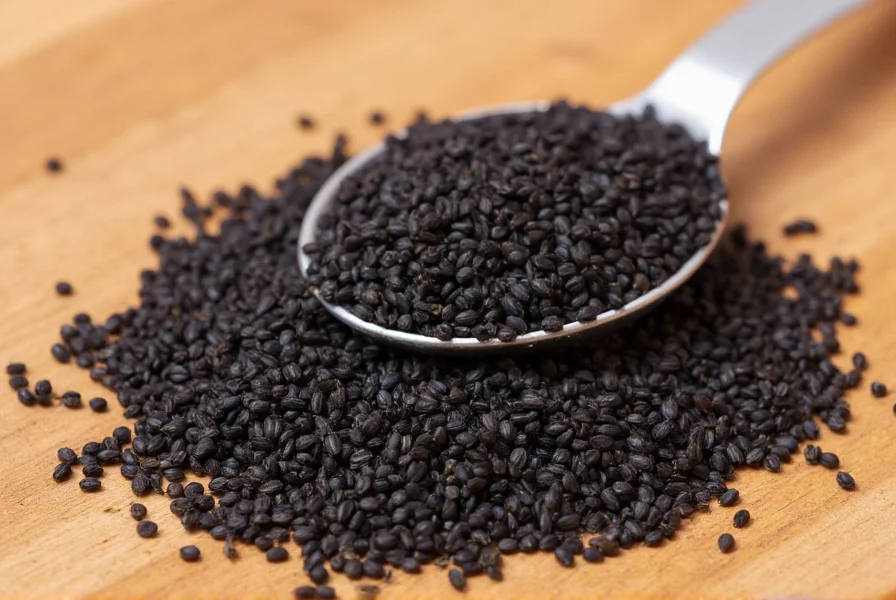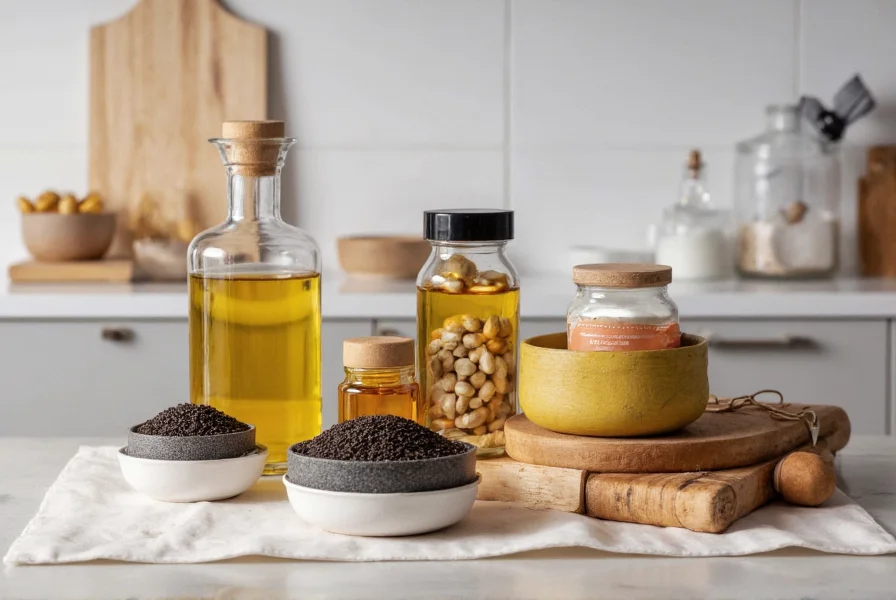For centuries, black seed (Nigella sativa) has been valued across Middle Eastern, South Asian, and Mediterranean cultures for both culinary and wellness purposes. This small, black, teardrop-shaped seed comes from a flowering plant in the Ranunculaceae family and should not be confused with onion seed or black sesame. Modern research has begun validating many traditional uses while clarifying appropriate applications and limitations.
Understanding Black Seed: Botanical and Historical Context
Native to Southwest Asia, Nigella sativa has been referenced in ancient texts including the Old Testament and hadith literature. Archaeological evidence shows its presence in Egyptian pharaoh Tutankhamun's tomb, suggesting historical significance in traditional medicine systems. The plant grows to about 20-30 cm tall with delicate flowers producing seed pods containing numerous black seeds.
Common names vary globally:
- Kalonji (South Asia)
- Black cumin (though unrelated to Cuminum cyminum)
- Habbat al-barakah ("blessed seed" in Arabic)
- Charila (Persian)
Chemical Composition and Active Compounds
The therapeutic potential of black seed primarily comes from its complex chemical profile. Key components include:
| Compound | Concentration | Significance |
|---|---|---|
| Thymoquinone | 0.2-0.5% | Primary bioactive compound with antioxidant and anti-inflammatory properties |
| Nigellone | Trace amounts | May support respiratory health |
| Fixed oils | 30-45% | Rich in unsaturated fatty acids including linoleic acid |
| Proteins | 20-25% | Source of essential amino acids |
Thymoquinone represents the most extensively studied component, accounting for many of black seed's observed biological effects. However, research suggests the whole seed or oil may provide synergistic benefits beyond isolated compounds—a concept known as the "entourage effect. "

Scientifically Researched Health Benefits
While traditional medicine attributes numerous benefits to black seed, scientific research provides more nuanced understanding. Current evidence supports several potential applications:
Immune System Modulation
Multiple studies indicate black seed may help regulate immune function. A 2020 review in Immunology Letters analyzed 25 studies and found thymoquinone demonstrates immunomodulatory effects, potentially beneficial for autoimmune conditions. However, most evidence comes from animal studies or in vitro research, with limited human clinical trials.
Blood Sugar Management
Research suggests black seed may support healthy blood glucose levels. A meta-analysis of seven clinical trials (total n=258 participants) published in Complementary Therapies in Medicine (2021) concluded that black seed supplementation significantly reduced fasting blood glucose and HbA1c levels in people with type 2 diabetes compared to placebo.
Respiratory Health Support
Traditional use for respiratory conditions finds some support in modern research. A randomized controlled trial with 80 participants published in Evidence-Based Complementary and Alternative Medicine (2017) found black seed oil improved asthma control scores and reduced medication use compared to placebo over an 8-week period.
Traditional Uses vs. Scientific Evidence
Many traditional applications of black seed lack robust scientific validation. Understanding the evidence gap helps consumers make informed decisions:
- Cancer prevention: While laboratory studies show thymoquinone has anti-proliferative effects on cancer cells, human evidence remains limited to observational studies. The American Cancer Society states there's insufficient evidence to recommend black seed for cancer prevention or treatment.
- Weight management: Some small studies suggest potential benefits, but a 2022 systematic review in Nutrition Reviews concluded evidence remains preliminary and insufficient for clinical recommendations.
- Skin health: Topical application shows promise for certain conditions. A 2020 study in Dermatology and Therapy found black seed oil improved symptoms of hand eczema comparable to betamethasone cream, but with fewer side effects.
Practical Applications and Usage Guidelines
Black seed appears in several forms, each with different considerations:
Whole Seeds
Commonly used in cooking, particularly in Indian, Middle Eastern, and Turkish cuisines. Toasting enhances flavor. Typical culinary use ranges from 0.5-2 grams daily. Not recommended for therapeutic purposes due to lower bioavailability of active compounds.
Black Seed Oil
Extracted through cold-pressing, this concentrated form contains higher levels of active compounds. Research studies typically use doses of 1-3 mL daily. Store in dark glass bottles away from light and heat to preserve potency. Quality varies significantly between products—look for third-party testing verification.
Supplements
Capsules containing seed powder or oil provide standardized dosing. Most clinical trials use 500-1000 mg daily of standardized extracts containing 0.5-3% thymoquinone. Choose products with transparent labeling of active compound concentrations.

Safety Considerations and Potential Interactions
While generally recognized as safe for culinary use, therapeutic applications require caution:
- Pregnancy and breastfeeding: Avoid medicinal doses due to potential uterine stimulant effects. Culinary amounts appear safe.
- Medication interactions: Black seed may interact with drugs metabolized by CYP3A4 enzymes, including some blood pressure medications, immunosuppressants, and statins. Consult healthcare providers before combining with medications.
- Allergic reactions: Rare but possible, especially in individuals with allergies to plants in the Ranunculaceae family.
- Blood sugar effects: May enhance effects of diabetes medications, potentially causing hypoglycemia.
- Blood pressure: May lower blood pressure, requiring monitoring for those on antihypertensive medications.
The European Medicines Agency considers black seed safe at culinary doses but notes insufficient data for medicinal use recommendations. Always start with low doses to assess tolerance.
Making Informed Choices About Black Seed Products
Product quality varies considerably in the unregulated supplement market. Consider these factors when selecting black seed products:
- Look for products specifying Nigella sativa on the label to avoid misidentification
- Choose cold-pressed oils stored in dark glass containers
- Check for third-party testing certifications (USP, NSF, ConsumerLab)
- Verify thymoquinone content when available
- Prefer products with transparent sourcing information
Be wary of products making exaggerated health claims, as legitimate manufacturers understand the current research limitations. Scientifically supported benefits of black seed oil for skin health represent one of the better-documented applications, while many other claimed benefits require more human clinical research.
Conclusion: A Balanced Perspective on Black Seed
Black seed shows promise as a complementary wellness approach, particularly for immune support, blood sugar management, and respiratory health. However, it's not a miracle cure, and expectations should align with current scientific understanding. The most compelling evidence supports its traditional culinary use and certain specific applications, while many popular claims lack robust human clinical validation.
As with any natural remedy, consult healthcare professionals before using black seed therapeutically, especially if managing health conditions or taking medications. Future research may clarify optimal applications, but for now, a balanced perspective recognizing both potential benefits and limitations serves consumers best.
Frequently Asked Questions
What is the most scientifically supported benefit of black seed?
Research most consistently supports black seed's anti-inflammatory properties, particularly through its thymoquinone content. Studies show potential benefits for immune modulation, blood sugar regulation, and respiratory health. A 2021 meta-analysis confirmed significant improvements in fasting blood glucose and HbA1c levels in people with type 2 diabetes using black seed supplements compared to placebo.
How much black seed oil should I take daily for health benefits?
Research studies typically use 1-3 mL (approximately 1/4 to 3/4 teaspoon) of black seed oil daily. For supplements, most clinical trials use 500-1000 mg of standardized extracts containing 0.5-3% thymoquinone. Always start with lower doses to assess tolerance and consult healthcare providers before beginning any new supplement regimen, especially if taking medications or managing health conditions.
Can black seed interact with medications?
Yes, black seed may interact with several medication types. It can enhance the effects of diabetes medications (risk of hypoglycemia), blood pressure medications (risk of hypotension), and drugs metabolized by CYP3A4 enzymes including some immunosuppressants and statins. Black seed may also increase bleeding risk when combined with anticoagulants. Always consult your healthcare provider before using black seed medicinally if you take prescription medications.
Is black seed safe during pregnancy?
Culinary amounts of black seed appear safe during pregnancy, but medicinal doses should be avoided. Some studies suggest high doses may stimulate uterine contractions. The European Medicines Agency recommends against using black seed medicinally during pregnancy due to insufficient safety data. Pregnant women should consult their healthcare providers before using black seed beyond normal food seasoning amounts.
How should I store black seed oil to maintain potency?
Store black seed oil in a dark glass bottle in a cool, dark place away from heat and light exposure, which can degrade the active compounds. Refrigeration after opening extends shelf life. Properly stored, high-quality black seed oil typically remains potent for 6-12 months. Check for rancidity by smell—fresh oil has a distinctive nutty aroma while rancid oil develops a sour or bitter odor.










 浙公网安备
33010002000092号
浙公网安备
33010002000092号 浙B2-20120091-4
浙B2-20120091-4